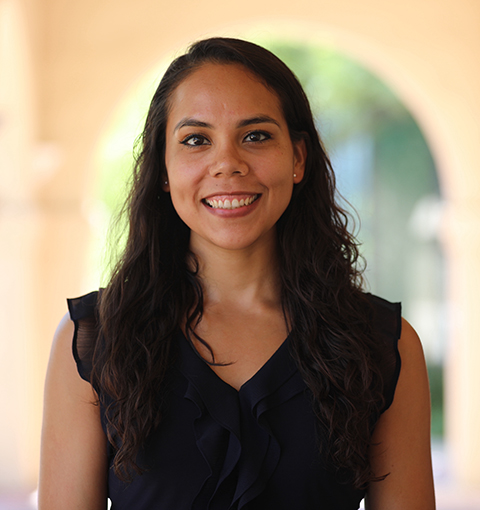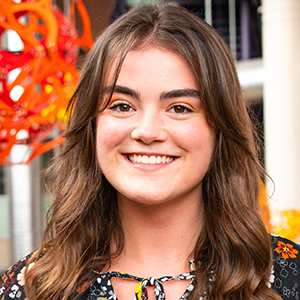
This MOSAIC scholar’s journey brought her home to share science
Melissa Ramirez grew up in Pasadena, California, where she developed a love for science and chemistry that carried into graduate studies and beyond and has now taken her back to her hometown as a postdoctoral fellow in synthetic and computational chemistry and a practitioner of science outreach.
As a teenager, Ramirez attended the California State Summer School for Mathematics and Science at the University of California Santa Cruz, a program that introduces high school students to topics such as robotics, computer science and animal behavior. In high school, the Caltech Summer Research Connection Program sparked her research interest. She studied chemistry at the University of Pennsylvania as an awardee of the Gates Millennium Scholarship, and a member of the American Chemical Society Scholars Program. She was the first member of her family to attend college.

During her second-year organic chemistry course, Ramirez became fascinated with the ability to modulate the reactivity of organic molecules through changes in their structure and pursued undergraduate research in organic synthesis.
“I loved to work with my hands in the lab and the dynamic nature of the academic space,” she said. “There is so much opportunity to merge different areas of organic chemistry to make new discoveries.”
After Ramirez began her Ph.D. at UCLA in organic chemistry, she became interested in designing enantioselective transition metal-catalyzed reactions. This led her to her position as a postdoctoral fellow at the California Institute of Technology, where she uses experiments and computations to develop widely applicable reactions for the synthesis of natural products. She is specifically interested in creating methodologies to synthesize spirocycles — building blocks for drug-like molecules.
Ramirez has received postdoctoral fellowships from Caltech and the National Science Foundation. This year she became a scholar in the American Society for Biochemistry and Molecular Biology Maximizing Opportunities for Scientific and Academic Independent Careers, or MOSAIC, program. Her MOSAIC project is titled “Methods for Enantioselective Spirocycle Synthesis and Radical Hydroamination of Trisubstituted Alkenes.”
Ramirez is a mentor to historically excluded students. As a leader in the Alliance for Diversity in Science & Engineering, a national organization that provides community and professional development opportunities to underrepresented students and scientists, she focuses on building community among students and helps to organize the annual Young Researcher Conference. She has also mentored grad students at Caltech through the Big Sib/Little Sib program.
Ramirez sees this program as a chance to hear about the experiences of fellow first-generation students and help them resolve the challenges they face. “For them,” she said, “I’m a point person for advice while helping to build a sense of belonging at Caltech.”
In turn, MOSAIC has provided support as Ramirez applies for a faculty position. Her MOSAIC mentor has given her practical feedback and helped her stay motivated to persevere through the rigorous process.
“My mentor is very thoughtful and makes time to check in, even just to say, ‘good luck,’” she said, “which goes such a long way when you’re feeling overwhelmed and in need of encouragement.”
With support from MOSAIC and Caltech, Ramirez has been able to return to her home city to inspire others to engage in science. This support will allow her “to engage with the local community and open doors for others at all levels regardless of their background,” she said. Ramirez recently spoke at the Pasadena mayor’s 2024 State of the City Address, where she shared her journey to Caltech as a Pasadenan and advocated for the importance of summer science and math opportunities for students in the Pasadena Unified School District.
And what are her plans once she lands that faculty position?
“I see myself training the next generation of synthetic and computational organic chemists and helping my department recruit and create inclusive spaces for postdocs, graduate students and undergrads alike.”
Enjoy reading ASBMB Today?
Become a member to receive the print edition four times a year and the digital edition monthly.
Learn moreGet the latest from ASBMB Today
Enter your email address, and we’ll send you a weekly email with recent articles, interviews and more.
Latest in People
People highlights or most popular articles

The data that did not fit
Brent Stockwell’s perseverance and work on the small molecule erastin led to the identification of ferroptosis, a regulated form of cell death with implications for cancer, neurodegeneration and infection.

Building a career in nutrition across continents
Driven by past women in science, Kazi Sarjana Safain left Bangladesh and pursued a scientific career in the U.S.

Kiessling wins glycobiology award
She was honored by the Society for Glycobiology for her work on protein–glycan interactions.

2026 ASBMB election results
Meet the new Council members and Nominating Committee member.

Simcox wins SACNAS mentorship award
She was recognized for her sustained excellence in mentorship and was honored at SACNAS’ 2025 National Conference.

From humble beginnings to unlocking lysosomal secrets
Monther Abu–Remaileh will receive the ASBMB’s 2026 Walter A. Shaw Young Investigator Award in Lipid Research at the ASBMB Annual Meeting, March 7-10 in Washington, D.C.

